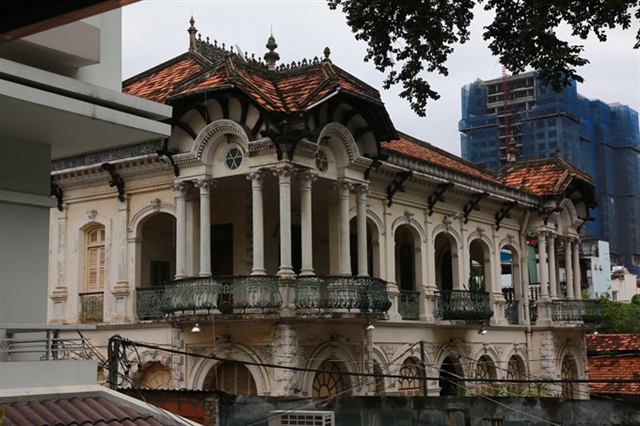 Society
Society

The HCM City Development and Research Institute should speed up the classification of old villas so that owners who might want to demolish the structures can build new houses, the city’s People’s Committee has said.

|
HCM CITY — The HCM City Development and Research Institute should speed up the classification of old villas so that owners who might want to demolish the structures can build new houses, the city’s People’s Committee has said.
Around 1,350 century-old houses and villas in HCM City, mostly in districts 1 and 3, need preservation and strict monitoring plans to avoid illegal dismantlement, according to city authorities.
A number of old villas in the city have been torn down recently without permission, they said.
Villa owners said they had asked multiple agencies for a long time for permission to demolish but the demolition licences were still pending.
Since authorities had delayed classifying and providing legal grounds for preservation, they had no right to prohibit the owners from demolishing the structure, they said.
If such villas are classified as eligible for historic preservation, the owner is allowed to repair it only after authorities give them the green light. In these cases, local authorities are required to fund the construction work.
As many as 1,300 old villas and houses in HCM City were built before 1975. However, the majority of them are privately owned.
As most of the villas and houses were left in a state of disrepair, the owners of many of them demolished them to build new houses. Since 1990, over 50 per cent of French villas have been torn down.
The HCM City Development and Research Institute has been asked to classify the remaining villas and houses into three types in which type 1 and 2 are houses that must be preserved, while type 3 are those that have little historic or architectural value and can be demolished.
But due to financial and human resource problems, and other limitations, classification work by the institute has faced challenges.
According to the institute, owners and state agencies have requested classification for nearly 900 old villas.
Of the figure, 780 cases were not eligible for classification as they have not been assessed and approved by the Department of Planning and Architecture under the current regulations.
Only 86 cases have been classified, of which 16 cases were classified as type 1; 49 cases type 2 (must be preserved); and 17 cases type 3 (can be demolished), according to the institute.
The institute has been ordered by the People’s Committee to impose strict monitoring measures to protect remaining historic properties from illegal demolition.
The institute said that it would also collect information about old villas from the media and agencies to speed up the progress of classification to ensure preservation of historic properties.
The city has about 3,000 valuable old houses and villas that could be preserved properly, but are likely to be demolished, according to the Architecture Research Centre at the city’s Department of Planning and Architecture.
Of that number, nearly 1,300 houses were built before 1975. About 168 of them are under State management and receive funds from the city’s budget for repair and preservation.
However, only eight houses remain in good condition, according to the Urban Research and Development Centre.
Valuable old buildings, mostly built during the French colonial period, include the HCM City People’s Court (built in 1881), King’s Palace or Revolutionary Museum (1885), Majestic Hotel and Notre Dame Cathedral (1887), Sài Gòn Post Office (1886-1891), HCM City’s People’s Committee (1907), Opera House (1900) and Bến Thành Market (1912-1914).
Many colonial villas have been renovated and now house schools, restaurants and coffee shops, most of which are located in District 3 on Tú Xương, Võ Văn Tần, Nguyễn Đình Chiểu, Lê Quý Đôn and Trần Quốc Thảo streets.
However, in recent years, many other old houses and villas have been demolished or have fallen into disrepair.
Under city regulations, if the villas are museums or state-owned houses, they are allowed to be maintained.
However, a large number that are private properties have not been taken care of properly. Some of the villas are so dilapidated they are no longer habitable. — VNS




